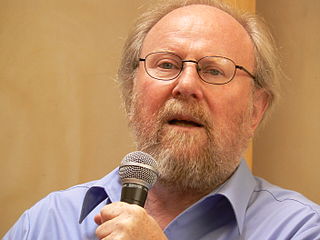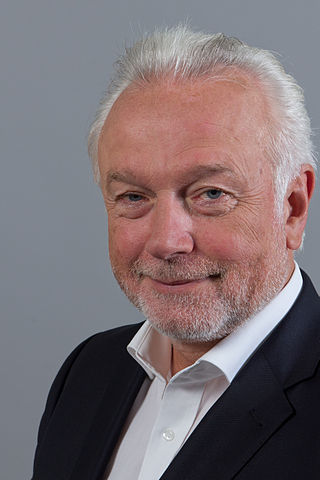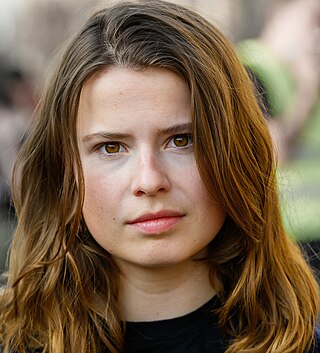
Anti-German is the generic name applied to a variety of theoretical and political tendencies within the left mainly in Germany and Austria. The Anti-Germans form one of the main camps within the broader Antifa movement, alongside the Anti-Zionist anti-imperialists, after the two currents split between the 1990s and the early 2000s as a result of their diverging views on Israel. The anti-Germans are a fringe movement within the German left: In 2006 Deutsche Welle estimated the number of anti-Germans to be between 500 and 3,000. The basic standpoint of the anti-Germans includes opposition to German nationalism, a critique of mainstream left anti-capitalist views, which are thought to be simplistic and structurally antisemitic, and a critique of antisemitism, which is considered to be deeply rooted in German cultural history. As a result of this analysis of antisemitism, support for Israel and opposition to Anti-Zionism is a primary unifying factor of the anti-German movement. The critical theory of Theodor Adorno and Max Horkheimer is often cited by anti-German theorists.

Wolfgang Thierse is a German politician of the Social Democratic Party (SPD). He served as the 11th president of the Bundestag from 1998 to 2005.

Beate Auguste Klarsfeld is a Franco-German journalist and Nazi hunter who, along with her French husband, Serge, became famous for their investigation and documentation of numerous Nazi war criminals, including Kurt Lischka, Alois Brunner, Klaus Barbie, Ernst Ehlers and Kurt Asche.

Joachim-Friedrich Martin Josef Merz is a German politician serving as Leader of the Christian Democratic Union (CDU) since 31 January 2022 and as leader of the Union parliamentary group as well as the Leader of the Opposition in the Bundestag since 15 February 2022. In September 2024 Merz became Union's designated candidate for Chancellor of Germany for the 2025 federal election.

Günter Nooke is a German CDU politician and a former civil rights activist.

Matthias Küntzel, is a German political scientist and historian. He was an external research associate at the Vidal Sassoon Center for the Study of Antisemitism (SICSA) at the Hebrew University of Jerusalem from 2004 to 2015. Currently, he is a member of the German Council on Foreign Relations DGAP and of the advisory board of UANI.

Germany–Israel relations are the diplomatic relationship between the Federal Republic of Germany and the State of Israel. After the end of World War II and the Holocaust, relations gradually thawed as West Germany offered to pay reparations to Israel in 1952 and diplomatic relations were officially established in 1965. Nonetheless, a deep mistrust of the German people remained widespread in Israel and the Jewish diaspora communities worldwide for many years after. Relations between East Germany and Israel never materialised. Israel and Germany now maintain a "special relationship" based on shared beliefs, Western values, and a combination of historical perspectives. Among the most important factors in their relations is Nazi Germany's genocide of Jews in Europe during the Holocaust.

Dirk Niebel is a German politician. From 2009 to 2013, he served as Federal Minister of Economic Cooperation and Development. From 2005 to 2009, he was secretary general of the FDP.

Moshe Zimmermann is an Israeli historian and writer. He is a professor emeritus at the Hebrew University of Jerusalem. From 1986 to 2012 he was the director of the Richard Koebner Minerva Center for German History.

Peter Ramsauer is a German politician of the Christian Social Union in Bavaria (CSU) who served as the Federal Minister of Transport, Building and Urban Development in the Second Merkel cabinet.

Jürgen Hardt is a German politician of the Christian Democratic Union (CDU) who has served as a member of the Bundestag since 2009.

Wolfgang Kubicki is a German politician of the Free Democratic Party of Germany (FDP) and member of the Bundestag from 1990 until 1992 and 2017 onwards. He has been vice chairman of the FDP in Germany since December 2013. Since 24 October 2017 he has served as Vice President of the Bundestag. From 1992 to 1993 and from 1996 to 2017 he served as chairman of the FDP-group in the Schleswig-Holstein state parliament..
Chosen and Excluded – The Hate on Jews in Europe is a German and French documentary film from Joachim Schroeder and Sophie Hafner about Antisemitism in Europe, the Middle East and inside the Muslim Community. It was commissioned by the public Franco-German TV network ARTE in 2015. It got attention in German and international media after the initial refusal of the two public TV networks ARTE and WDR to release the film. Both claimed the documentary did not live up to their standards. During the ongoing public discussion, the German tabloid Bild decided to show the documentary online for 24 hours without having the rights. Eventually, both, ARD and ARTE, broadcast the documentary on 21 June 2017.
Antisemitism is a growing problem in 21st-century Germany.

Luisa-Marie Neubauer is a German climate activist, politician and author. She is one of the main organizers of the school strike for climate movement in Germany, where it is commonly referred to under its alternative name Fridays for Future. She advocates a climate policy that complies with and surpasses the Paris Agreement and endorses de-growth. Neubauer is a member of Alliance 90/The Greens and the Green Youth.

Marcus Faber is a German politician of the Free Democratic Party (FDP) who has been serving as a member of the Bundestag from the state of Saxony-Anhalt since 2017.
The German-Israeli Future Forum Foundation is a charitable foundation based in Berlin. It was founded in 2007 by the Federal Republic of Germany and the State of Israel. It acts as a funding body and is directly involved in project implementation. The principal goal of the foundation is to promote German-Israeli cooperation. In the long term, this aim is realized chiefly through the following programs: project funding, the German-Israeli Future Network, the Sylke Tempel Fellowship and the Shimon Peres Prize.
Documenta fifteen, stylized as documenta fifteen, is the 15th edition of Documenta, a major international contemporary art exhibition held every five years in Kassel, Germany.

Germany–Palestine are relations between the Federal Republic of Germany and the State of Palestine. Germany does not recognize Palestine diplomatically. However, Germany has a Representation Office in Ramallah, while there is also a Palestinian Mission in Berlin. There are numerous contacts between both societies, and Germany provides economic support to the Palestinian Territories through development partnerships. Germany is diplomatically committed to a two-state solution and has acted as a mediator in the Arab–Israeli conflict in the past.

Michaela Barbara Engelmeier is a German politician (SPD). She was a member of the German Bundestag from 2013 to 2017. She is a former member of the German national women's judo team. From 2020 to 2022, she was the first Secretary General of the German-Israeli Society. Since September 2022, she has been chairwoman of the board of SoVD.
















